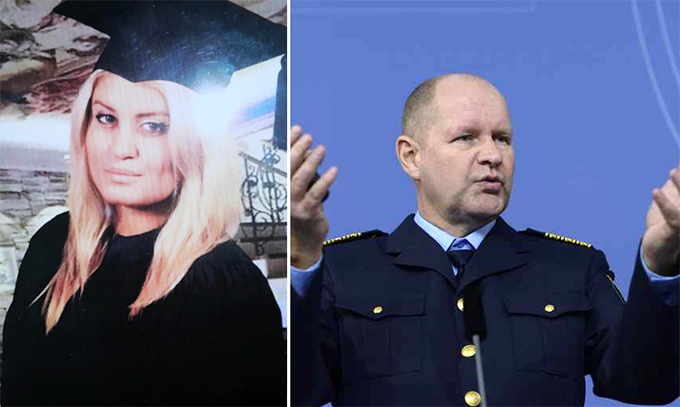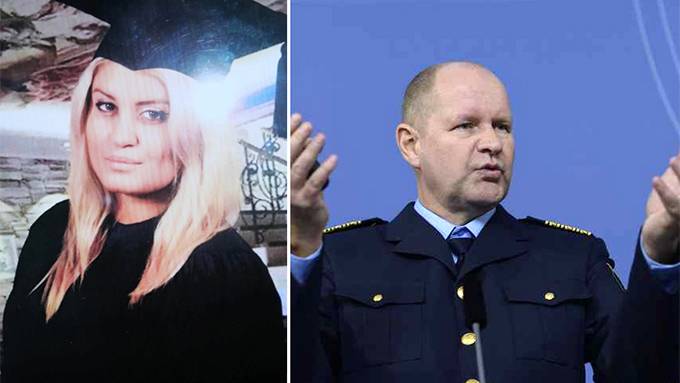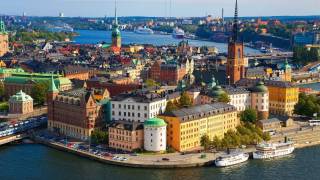Sweden: Death by Immigration
Source: gatestoneinstitute.org

Alexandra Mezher (left) was murdered in the home for "unaccompanied refugee children" where she worked. She was stabbed to death by a resident who claims to be 15 years old and from Somalia. When National Police Commissioner Dan Eliasson (right) spoke on television about the murder, he expressed sympathy for the murderer, but barely mentioned the victim.
Mass immigration is continuing to claim victims in Sweden. Murder, assaults and rape have become everyday occurrences in this small country, with a population just short of ten million, which last year opened its doors to almost 163,000 immigrants. The latest victim is 22-year-old Alexandra Mezher. She was stabbed to death last week by a so-called unaccompanied refugee child at the asylum house where she worked.
Although the massive influx of asylum seekers has decreased drastically since January 4, when Sweden implemented border controls on the Swedish/Danish border, the people who are already here pose a giant problem to municipalities, police and citizens. The police are fighting a losing battle against street crime, as well as daily incidents at asylum houses – general disturbances that include fights, rapes and threats.
The asylum houses are in a state of anarchy. On January 27, police were dispatched to a home for teenagers in Lindås, where a riot had erupted. Policeman Johan Nilsson told the local paper, Barometern:
"One [of the youths] was refused when he tried to buy candy, and got angry with the staff. He gathered some 15 friends, and the staff was forced to lock themselves in while the mob smashed windows and other things. The instigator, supposedly 16 years old, is suspected of having started the riot, and another one is suspected of making unlawful threats and of violent rioting."
That suspect was later released, after producing a document that stated he was under 15, and thus not criminally responsible.
Another, more serious incident occurred at the asylum house Signalisten in Västerås on January 20. Ten policemen arrived at the facility due to reports of the repeated rape of a 10-year-old boy. The policemen were met by a large mob standing in a corridor, shouting and shaking their fists. The situation escalated to the point where the police were forced to flee for their lives. One of the officers later wrote in his report that it was only due to the presence of a police dog handler that he and his colleagues were able to escape:
"Even more people appeared behind us. I was mentally prepared to fight for my life. We were 10 police officers in a narrow corridor. And I heard someone yell that there is an emergency exit. I felt that we could easily have been outmaneuvered, considering the environment and the number of counterparties."
The policeman also wrote in his report that he hoped for more training in the future, on "how to handle crowds in confined spaces."
That the Swedish police are no longer able to do their duty is evident. National Police Commissioner Dan Eliasson recently demanded 2,500 more officers and 1,600 more civilian employees for the police, to handle the heightened terror threat and the increased influx of refugees. Considering the length of time needed to train policemen, it will probably be a while before the police can increase its numbers. Eliasson also demanded a budget increase of between 1.8 and 2.8 billion kronor ($214 million - $332 million), because the "migrant situation means a significantly higher workload for the police."
He identified at border controls and asylum houses as especially in need of greater resources, all over the country: "We need to be there often, there are fights and disturbances."
On January 26, what everyone had been dreading finally happened. The police arrived at an asylum house for "unaccompanied refugee children" in Mölndal early in the morning, after reports of a knife fight. By the time they arrived, it was too late. Asylum house employee Alexandra Mezher lay bleeding on the floor, stabbed by one of the "children" she cared for. She died in hospital a few hours later.
The police arrested a person claiming to be a 15-year-old from Somalia on suspicion of murder, as well as the attempted murder of one of the youths who allegedly tried to intervene. He was later remanded. According to the local daily, GT, the staff had previously warned on several occasions that the suspect had psychiatric problems.
The Mezher family are Lebanese Christians who fled the violence in Lebanon 25 years ago. Alexandra's mother, Chimene Mezher, told the British paper, The Daily Mail:
"We left Lebanon to escape the civil war, the violence and the danger. We came to Sweden where it was safe, to start our family. But it is not safe any more. ... And I just want to know why... why Alexandra? She wanted to help them, but they did this. I just want answers."
Chimene Mezher now accuses Swedish politicians of murdering her daughter. The dramatic recent population increase in Mölndal, a suburb of Gothenburg, has scared many of the 60,000 residents. In less than a year, 8,000 asylum seekers have moved in -- half of whom are so-called "unaccompanied refugee children."
It has now emerged that staff at the asylum house where Alexandra Mezher was murdered had repeatedly complained about unreasonable conditions. A year ago, employees warned about being understaffed and working alone: "So far, nothing serious has happened, but it will," said a desperate employee who called the Health and Social Care Inspectorate ("Inspektionen för vård och omsorg" or IVO). IVO inspected the asylum house, but found everything was in order. When Mezher was murdered, she was alone in the residence with ten asylum seekers. So far, no motive for the murder has emerged.
When the National Police Commissioner appeared on the "Good Morning Sweden" TV show, the day after Mezher's murder, he expressed sympathy for the murderer, but barely mentioned the victim. This sparked frenzied outrage on social media. Eliasson said:
"Well, you are of course distraught on behalf of everyone involved. Naturally, for the person killed and her family, but also for a lone young boy who commits such a heinous incident. What has that person been through? Under what circumstances has he grown up? What is the trauma he carries? This entire migration crisis shows how unfair life is in many parts of the world. We have to try to help solve this best we can."
The atmosphere on social media is now almost revolutionary. People are posting videos of themselves accusing the government of murder, of filling Sweden with violent people and completely ignoring Swedes.
What does the Swedish government really think? Does it maintain that the right of asylum is more important than everything else -- even the safety of its own people?
Gatestone Institute called Sofia Häggmark, a non-partisan official at the Department of Justice unit for migration rights. Here is the Q & A:
Should everyone get to seek asylum in Sweden, even if it leads to Sweden's undoing?
"The right of asylum is very strong. We have international rules and EU rules that say that if a person comes to an EU country, that person has a right to seek asylum."
Is it all right to say no if there are groups in your country that are being threatened by the asylum seekers -- minority populations such as Roma, Jews and Sami [Lapp]? Or that Sweden cannot afford it?
"No, if a person has grounds for asylum or risks the death penalty or torture in their home country, you cannot deny them asylum."
Is it not the Swedish government's primary task to protect Sweden and the Swedish people?
"We need to abide by international rules; we are obliged to do that. We can be dragged before the Court of Justice of the European Union if we do not allow people to seek asylum."
Which is more important – Swedish lives, or the risk that you might end up before the Court of Justice of the European Union?
"I cannot answer that question; I can only tell you what the rules are."
So you are saying that if 30 million people come here to kill us, we have no defense, we cannot stop it?
"I can only tell you that the right of asylum gives very strong protection."
But not for the Swedes?
"If a person kills someone here in Sweden, the criminal justice system handles that and tries them. We need to look at every individual asylum case."
Do you think it has ever happened at any time in the history of the world that a country cared more for the citizens of other countries than its own?
"I cannot answer that. But there is no rule that sets a limit for how many [asylum seekers] Sweden can accept."
So there is no plan for what to do when the country is full and the citizens are scared?
"No, there is not."
Do you personally think that feels okay?
"I cannot answer that. That is not my job."
If several millions of Muslims come here and implement Sharia law, then the right of asylum has effectively contributed to abolishing the democracy in our country, replacing the Swedish people and annihilating the whole concept of Sweden. Have none of you pondered these fateful issues?
"I understand your thoughts."
The measures taken by the government on January 4 were a way to stop immigration without compromising the almighty "right of asylum," because only those who actually set foot on Swedish soil have the right to seek asylum. The government imposed carriers' liability for the train and ferry companies operating on the route between Denmark and Sweden, which means that those companies had to hire guards to refuse passage to anyone that cannot show a passport or other valid ID. This is the first time people cannot travel freely between the Nordic countries since the Nordic Passport Union was introduced in 1952.
The new identity checks have created a problem for Denmark, which was not at all keen to get stuck with all the asylum seekers headed for Sweden. Thus, Denmark introduced its own controls on the German border.
Otherwise, Denmark has chosen a different path from Sweden. Instead of preventing people from seeking asylum, the Danish Parliament adopted a new law on January 26, which includes sharp austerity measures towards asylum seekers – measures that the government hopes will discourage migrants from coming to Denmark. The new rules include:
- Shorter residence permits
- Postponement of the right to bring in relatives
- The right of the state to seize a migrant's assets to cover asylum costs
- Stricter qualifications to get permanent residency
- An easing of the process for revoking the residency of refugees
- A 10% cut in cash benefits for asylum seekers
- Asylum seekers can only keep assets worth up to a total of 10.000 Danish krone ($1500), excluding jewelry of sentimental value.
This last rule has been widely debated -- and condemned, especially in Sweden. But the truth is that Sweden has a similar law, called the Reception of Asylum Seekers Law (Mottagande av asylsökande), which was introduced in 1994. Section 15 of the law states:
"A person who has a job, or other income or private assets, and lives in an asylum house, must pay a reasonable amount as compensation to the Migration Service. When food is included in the accommodation, a reasonable compensation should also be paid."
However, Swedish authorities, with broad political agreement, ignore this law.
Even the Danish Social Democrats supported the law. In 2010, the party demanded that Europe "make way for Islam," but now it has apparently made a complete U-turn. Social Democratic Faction Chairman Henrik Sass Larsen wrote in an opinion piece in the daily, Politiken:
"We will do all we can to limit the number of non-Western refugees and immigrants to this country. That is why we have gone far – much farther – than we ever dreamed of. We do this because we do not want to sacrifice the welfare state in the name of humanism. Because the welfare state is ... the political project of the Social Democrats. It is a society built on the principles of freedom, equality and solidarity. Mass immigration – look at Sweden for example – will undermine the economic and social foundation of the welfare state."
But protecting the welfare state that generations of Swedes have built, does not seem to be a priority for the Swedish Social Democrats. Some have long claimed that the Social Democratic affinity for immigration has to do with the party's desire to fill the country with "election cattle," and fuel has now been added to that fire. Muslims most often seem to vote for the left, studies show. For example, 93% of French Muslims voted for Socialist President François Hollande, and almost 90% of American Muslims voted for President Obama.
Judging by recent polls, Swedish Prime Minister Stefan Löfven will indeed need the Muslim votes in order to remain in power. The respected polling institute, Sifo, recently presented a report on party sympathies for the month of January. The Social Democrats got a pitiful 23.2% – the worst result since polling started in 1967. The party got 31% in the general election of 2014, and that was considered a rotten result.
Meanwhile, after the new border controls were implemented in January, and the number of asylum seekers arriving in Sweden decreased from a peak of over 10,000 a week, to 820 (during the third week of January), no one could tell if this was due to the border controls or the wintry weather.
In total, 162,877 people sought asylum in Sweden in 2015. That is almost twice as many as the year before and many times the average during the 2000s, which was roughly 33,000 a year.
Now, Minister for Home Affairs Anders Ygeman tells the Dagens Industri business paper that he has tasked the police and the Immigration Service with the deportations of up to 80,000 of the asylum seekers who arrived last year. The government plans on using chartered planes. Anders Ygeman describes the operation as a "very big challenge."
...
Read the rest: gatestoneinstitute.org






















